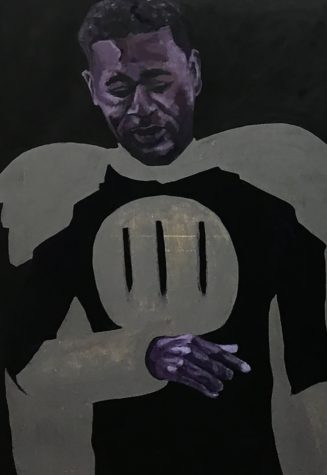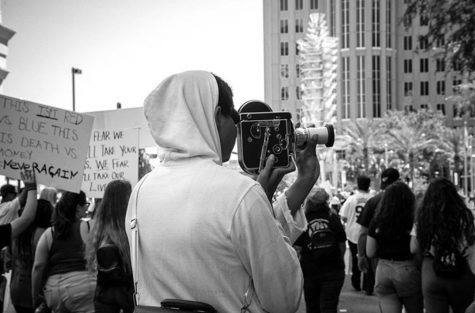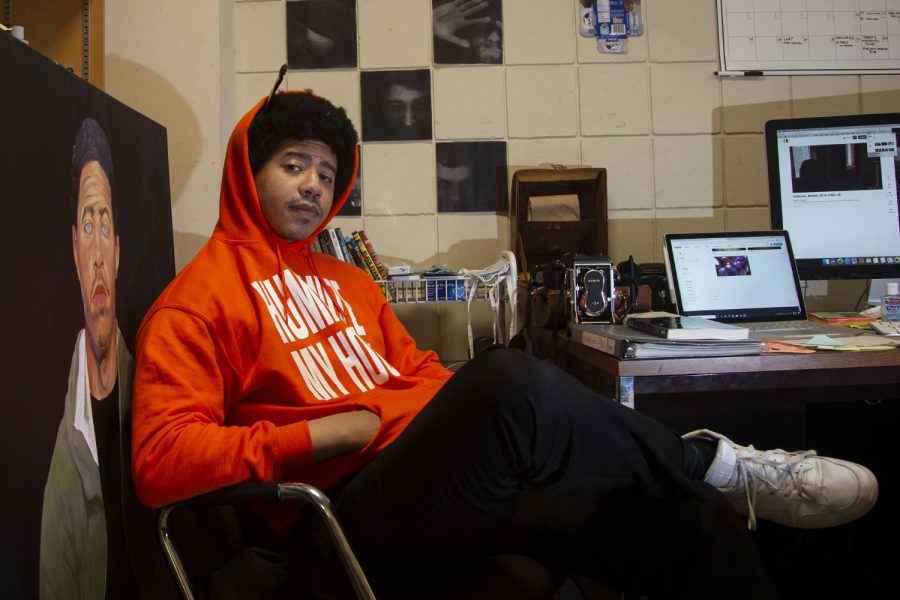University of Iowa student Trevon Coleman paves way for filmmakers of color
Trevon Coleman, a graduate student in the MFA program at the University of Iowa in film and video production learned valuable lessons from working in Florida as a caricature artist. Now, he teaches students, creates experimental films, and explores his art with the main idea of understanding while prioritizing Black identities.
Second-year graduate student in the MFA program in film and video production at the University of Iowa, Trevon Coleman, poses for a portrait in his office at the Becker Communication Studies Building on Wednesday, April 28, 2021.
May 4, 2021
Trevon Coleman was drawing an 8-year-old boy during his previous job as a caricature artist in Orlando, Florida. The boy’s father mentioned an insecurity that his 8-year-old son had about his large gums.
“It’s up to us to let him know that there’s nothing wrong with that,” Coleman said to the father.
After Coleman finished his drawing, the father circled back to him. He told Coleman no one had ever let him know he had permission to tell his son there is nothing wrong with insecurities.
“For me that was wild to be in a position to help someone else help someone who meant something to them to feel seen like that,” Coleman said. “It’s important for people to know that how they are is OK, and someone sees them regardless.”
As a Black American and second-year graduate student in the MFA program in film and video production, Coleman has applied this story and lesson to his life and pieces of work.
Coleman created the “Super” series, as a response to an encounter he had with a professor. He had created a self-portrait while showing teeth. As it was a caricature painting, Coleman had exaggerated the teeth.
The professor misread the painting and made a comment about Blackness and showing teeth.
“They likened showing the teeth with being angry, and to horses when they get angry and showing their teeth,” Coleman said. “And I was like, that one was rude. You hear yourself? You’re equating Blackness to animals.”
Because of the encounter with his professor, Coleman started creating work that tested the spaces he was in and how they viewed Blackness. His “Super” series work involved the idea of Black bodies in hoodies transitioning to Black bodies in superhero costumes. These films, focusing on assumptions and perceptions, give superhero iconography to Black bodies, but there are no fight scenes or characters with superpowers.

“So, if that’s the case for this superhero film, what’s your case for the idea of what Black people accomplish for imagination?” Coleman said. “Be that fear, be that fetishization, be that anything.”
“Super,” focused on perceptions of Black bodies, resonates with Coleman in terms of how people are seeing him.
Friend and former roommate of Coleman’s at the University of Central Florida Dro Watson, who played the LGBT superhero in the film, spoke about Coleman’s passion during the production of this film.
“It was just wonderful to see him in his element directing and working on this project,” Watson said.
Coleman has created visual content based on understanding ever since his job as a caricature artist. Since 2003, Coleman has continued his caricature work.
“I was always a storyteller,” Coleman said. “Very imaginative, I would say — I got into art through telling stories.”
Being on the job with others working in animation, comic books, and illustration, Coleman learned a lot about himself and his art.
“That’s where I would say I would have my biggest arts education, was from being around so many different kinds of people,” he said.
After his experience as a caricature artist, Coleman has worked hard to help others back at the University of Central Florida, and here at the University Iowa as a teaching assistant.
After his job as a caricature artist at a local theme park, Coleman acquired his BFA in studio art, and his BFA in film and video production at the University of Central Florida in 2019. While there, Coleman says he was always looking for ways to mentor, guide others, and get involved. At UCF, Coleman was a student liaison in the school of visual arts and design, a resident assistant for four years, and an employee in equipment checkout.
Teaching students now at the UI, Coleman said he does his best to help others create work they are passionate about.
“Can you see ways to make the things you’re interested possible? If not, I can help you see those,” Coleman said to his students. “Are you interested in making new lanes? I can help you figure that out.”
As a creator, Coleman has worked on about 30 film sets for films and projects in total, operating the camera, working with actors, and facilitating in a collaborative way, helping those on set feel understood and seen.
“I think that Tre himself is sensitive, and I think that he is sensitive to other people,” Watson said. “I think that he is sensitive to concepts and sensitive to changing information.”
Watson, who just recently graduated with her MFA in feature filmmaking at UCF, also mentions Coleman’s receptiveness and willingness to evolve and change ideas when receiving new information.
Watson has worked on projects with Coleman ranging from her own thesis feature and projects, to other people’s work, and a few of Coleman’s projects as well.
“Something that I have learned that is most important to me from Tre is really prospective and the way to approach media,” Watson said.
Coleman does not necessarily follow conventional narratives that have a beginning, middle, and end with his experimental work.

“I’m playing with exposure, I’m playing with frame-to-frame changes,” Coleman said. “I’m playing with editing. I’m interested in the way editing can be used to disrupt a narrative.”
Coleman also creates work that focuses on how others are being seen through a camera, and experimented with this idea on the first film he made and worked on, titled “Work.”
“Work,” which began in 2016, was an experimental film working with hula-hoop dancers. In collaboration with others, Coleman was able to create a film that spoke up about topics like the gaze — the way women in films are looked at by audience members and camera operators. In addition to the gaze, he also brought light to motion in the human figure, and addressed how the camera overlooks racialized bodies.
“Work” evolved over the course of four years, with four different versions of the film.
As seen through “Work,” Coleman takes an atypical and interesting approach.
“For me, I’m more interested in what the camera sees,” Coleman said.
Coleman has made work where he utilizes actors who speak different languages, and even though he doesn’t understand what the actors are saying, the message still comes through.
“I like not knowing what the end is going to be,” Coleman said. “I want to learn through the process of making.”
With Coleman’s abstract work, there is less of a definite answer in these films, but it leaves the audience with more questions.
Coleman pursues a very collaborative process. Hao Zhou, a second-year in the MFA program for film and video production, shares an office space with Coleman, and the two have worked on projects and assignments together.
“When working with others, Trevon is very positive and has a sincere interest in everybody’s contributions,” Zhou wrote in an email to The Daily Iowan. “He always makes you feel that your ideas are worthwhile, and he can quickly expand and connect them in other areas that you never thought about.”
Along with Coleman’s positivity and connectedness on set, Zhou wrote about learning from Coleman’s feedback and advice when working on his own ideas and works.
“I’ve tried to learn from Trevon’s strong ability to think from different (and even opposite) perspectives,” Zhou wrote. “This is a great ability for all areas in life but especially for creating art, stories, and characters.”
Coleman’s collaborative filming process altered because of the pandemic. Without focus groups with community members and a normal filming schedule and set, Coleman has been able to create pieces of work that are more personal to him.
“I usually make responsive work addressing something that has been said or environments that I’m in,” Coleman said. “I’ve made some more personal works in this time that are not trying to speak to some sort of broader idea, but [are] really me sitting alone in a room grappling with things that I’m struggling to understand about myself.”
Coleman continues to work on his films and art in conjunction with the act of understanding. Influenced by everything, Coleman’s many goals for the future include learning more about himself, and the space he is in.
Coleman is currently working on a piece that involves the conversation of Blackness and climate change.
“You’ve created this thing that is now bigger than you,” Coleman said. “And you can’t control it, you can’t contain it, you can’t stop the change from happening.”
He further explains climate change as a destruction, and why he compares Blackness to it.
“There was a world that was built around exclusion,” Coleman said. “And there’s a way to tear that down and destroy that world and rebuild something else.”



